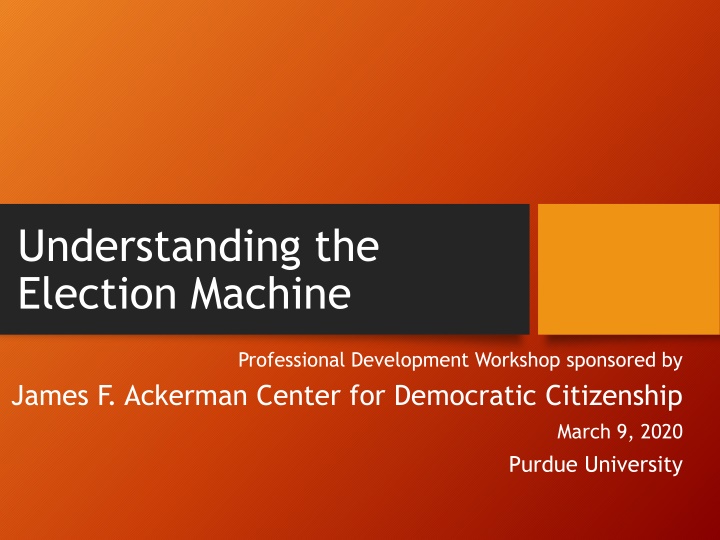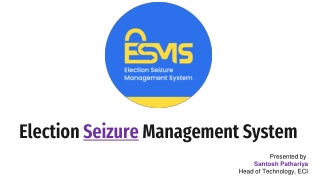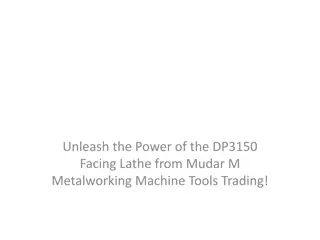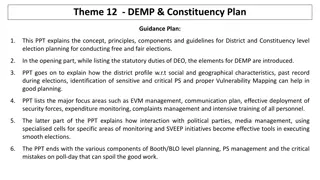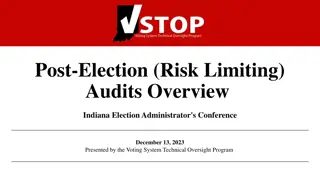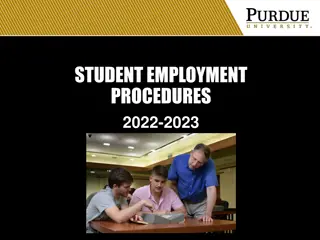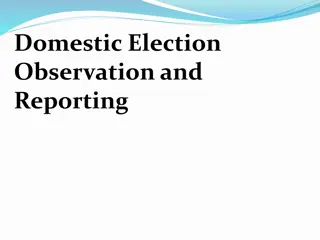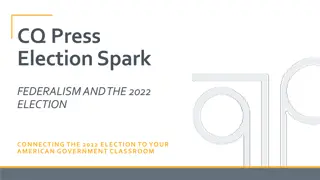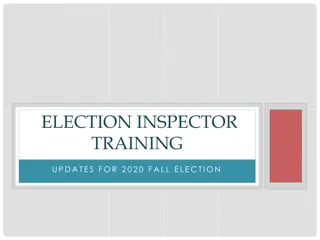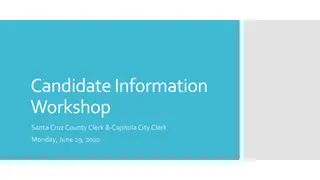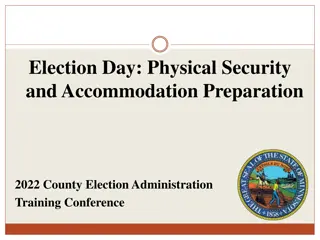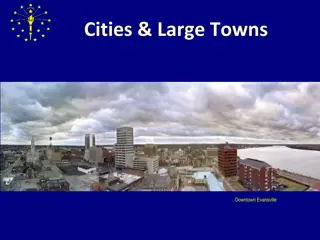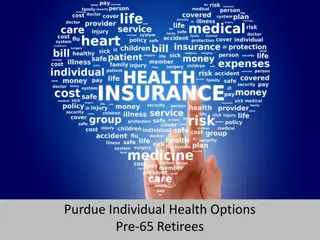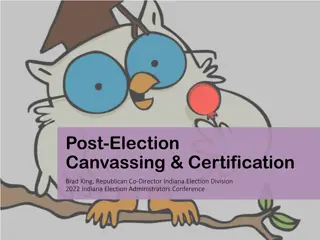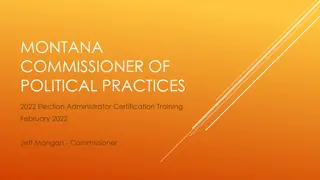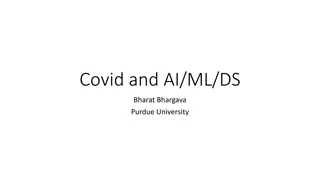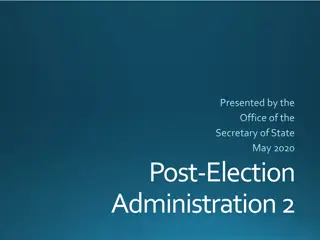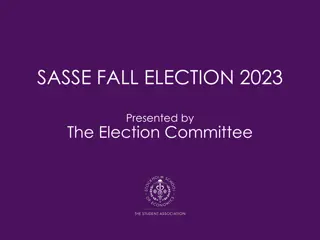Election Machine Professional Development Workshop at Purdue University
Explore the Election Machine Professional Development Workshop held at Purdue University, sponsored by the James F. Ackerman Center for Democratic Citizenship. The workshop focused on Teaching Elections and featured insights on the importance of fact-based analysis, economics in presidential elections, and opportunities to engage with experts. The event culminated in a series on Corporate Citizenship and Ethics, showcasing notable speakers like Pulitzer Prize winner John Carryrou. Discover valuable resources and upcoming events from the Ackerman Center. Dive into the world of elections, politics, and civic engagement through this enriching workshop series.
Download Presentation

Please find below an Image/Link to download the presentation.
The content on the website is provided AS IS for your information and personal use only. It may not be sold, licensed, or shared on other websites without obtaining consent from the author.If you encounter any issues during the download, it is possible that the publisher has removed the file from their server.
You are allowed to download the files provided on this website for personal or commercial use, subject to the condition that they are used lawfully. All files are the property of their respective owners.
The content on the website is provided AS IS for your information and personal use only. It may not be sold, licensed, or shared on other websites without obtaining consent from the author.
E N D
Presentation Transcript
Understanding the Election Machine Professional Development Workshop sponsored by James F. Ackerman Center for Democratic Citizenship March 9, 2020 Purdue University
Welcome. Last of 3 Ackerman Center professional development workshops around the theme of Teaching Elections, Despite the Politics
Ackerman Center for Democratic Citizenship Purdue Series on Corporate Purdue Series on Corporate Citizenship and Ethics Citizenship and Ethics (w/ support from Purdue Federal Credit Union): John John Carryrou Carryrou ( (31stspeaker | 13,000+ attendance) Pulitzer Prize-winning investigative journalist and author of the New York Times bestseller Bad Blood Thursday, April 16, 2020 7:00 p.m. Loeb Playhouse in Stewart Center
Ackerman PD Series webpage Resources for all three PD sessions: https://www.education.purdue.edu/ackerman- center/programs/professional-development/ Follow the Ackerman Center on Facebook
Why this topic? Election season is heating up! Super Tuesday; thinning of Democratic field Importance of fact-based analysis/lesson plans Chance to ask an expert questions about presidential elections that you always wanted to know the answers to .e.g., How does polling work? What happens behind the scenes ? Why do we have two major parties?
Economics & Presidential Elections Who said: The economy, stupid .? Candidate Bill Clinton during the 1992 election . EconEdLink s Election Economics (https://www.econedlink.org/resources/collection/election -economics/). Activity: Economic Misery and Presidential Elections Growth rate in real GDP per capita: % in real GDP per person. Misery Index : unemployment rate (U3) + the inflation (CPI-U) rate. What predictive rules can you hypothesize?
Economic Rules in Presidential Elections A real GDP per capita growth rule: The incumbent party usually wins if The growth rate of real GDP per capita accelerates (is a higher %) in the election year. A Misery Index rule: The incumbent usually wins if: The Misery Index has decreased (or not increased) from the year prior to the election.
11/14 12/14
Economic Misery and Presidential Elections 2020 Election: Predictions??? Incumbent W/L? Candidates? Growth Real GDP/ capita 1.7 Unemp. Rate (%) Inflation Rate (%) Misery Index GDP Growth Rule? Misery Index Rule? 2017 4.4 2.1 6.5 2018 2.3 3.9 2.4 6.3 2019 2.0 3.8 2.5 6.3 2020 (thru 3/1) 2.1a 3.6b 1.2b 5.8 ausing projected 2020 data bthrough Feb. 2020
Pre-session brainstorming Let s take a few minutes to prime the pump by generating several questions for our expert Modified Think-Pair-Share On the note card list 2-3 questions about presidential elections, polling, primaries, etc. that you are curious about.. On the note card list 2-3 questions your students (or any voter, for that matter) ask you about presidential elections; things they should know, but don t . Turn to a colleague and compare your lists, adding questions . Hold onto these .
Jay McCann Professor of political science here at Purdue University. A Chicago native, he did his doctoral studies at the University of Colorado in Boulder and worked for two years at Harvard before coming to Purdue. His research and teaching activities focus on questions of democratic engagement and representation, particularly representation through elections: How do voters go about making up their minds during campaigns? Who participates at the ballot box, and what kinds of signals are ultimately sent to officials? He writing a book about how immigrants in the United States learn about American politics and the factors that shape their involvement. He has served as a leader of the Civics Literacy Working Group (at Purdue) exploring the proposed civic literacy graduation requirement. You might see him running on the West Lafayette High School track or near the Celery Bog nature reserve.
[Note to all of the visiting teachers: this is a version of the opening slide I used each class meeting in POL 101 last semester .] Teaching about Elections (Despite the Politics) Jay McCann Professor of Political Science Purdue University mccannj@purdue.edu
The Spirit of the Times? Fair amount of cynicism among your students? Genuine confusion about politics and the direction of the country? Lack of historic context?
The Spirit of the Times? Fair amount of cynicism among your students? Genuine confusion about politics and the direction of the country? Lack of historic context? But at the same time underlying hopefulness, and a desire to move forward together in constructive ways?
Our Students Ask the Darnest Things Do polls in politics make any sense? Should I even care about them? I hear so much about fake news how do I tell what s right? Why do we have just the two main parties? Wouldn t it be better if we had many more? I hate picking between the lesser of two evils or the evils of two lessers. Money determines everything in elections, right?
Our Students Ask the Darndest Things Do polls in politics make any sense? Should I even care about them? I hear so much about fake news how do I tell what s right? Why do we have just the two main parties? Wouldn t it be better if we had many more? I hate picking between the lesser of two evils or the evils of two lessers. Money determines everything in elections, right? How might we respond to these questions and concerns and engage students in constructive active learning experiences?
Do polls in politics make any sense? Should I even care about them?
Do polls in politics make any sense? Should I even care about them? Old thinking about polls: Pollsters measure attitudes in the same way that doctors take our temperature.
Do polls in politics make any sense? Should I even care about them? Old thinking about polls: Pollsters measure attitudes in the same way that doctors take our temperature. New thinking about polls: Opinions to a fair extent are constructed on the spot polls are snapshots, and can be influenced by many considerations Longstanding predispositions Things we just heard Features of the immediate survey environment (race / gender of interviewer, question-order effects, question wording effects )
Do polls in politics make any sense? Should I even care about them? Survey designed to plant beliefs in the heads of respondents Tricky to make sense out of double-negative wording Hard-to-interpret double barrel item
Do polls in politics make any sense? Should I even care about them? So should you care? Smart not to invest too much in one particular finding from a survey.
Do polls in politics make any sense? Should I even care about them? So should you care? Smart not to invest too much in one particular finding from a survey.
Do polls in politics make any sense? Should I even care about them? So should you care? Smart not to invest too much in one particular finding from a survey. Also smart to recognize that the margin of error is just one source of error Nonresponse biases? Biases of the polling firm? Misinterpretations of results?
Do polls in politics make any sense? Should I even care about them? So should you care? Smart not to invest too much in one particular finding from a survey. Also smart to recognize that the margin of error is just one source of error Nonresponse biases? Biases of the polling firm? Misinterpretations of results? One statistician s rule of thumb: whatever the stated margin of error is, you should probably double it.
Do polls in politics make any sense? Should I even care about them? So should you care? Smart not to invest too much in one particular finding from a survey. Also smart to recognize that the margin of error is just one source of error Nonresponse biases? Biases of the polling firm? Misinterpretations of results? That said: polls ARE informative for citizens, no? Cases in point: primary voters seeking to find a candidate who is most electable ; officials seeking to learn how they re doing; all of us seeking to break out of our immediate information bubble !
Do polls in politics make any sense? Should I even care about them? So should you care? Smart not to invest too much in one particular finding from a survey. Also smart to recognize that the margin of error is just one source of error Nonresponse biases? Biases of the polling firm? Misinterpretations of results? Active learning suggestion: Have students team up on an exit poll!
Do polls in politics make any sense? Should I even care about them?
I hear so much about fake news how do I tell what s right?
I hear so much about fake news how do I tell what s right? First, reassure students that inflammatory accusations and conspiracy theory peddling are nothing new in our country
I hear so much about fake news how do I tell what s right? Then, take the opportunity to discuss ways that we fake ourselves out -- Motivated Reasoning is a big term in political science: we tend to agree with information that fits with our prior views. So be aware of your own core beliefs! And we tend to trust information that comes from trusted sources even if those sources aren t any better informed than we are! So be on guard for this, too!
I hear so much about fake news how do I tell what s right? And then, perhaps peruse the major Fact Checking sites?
I hear so much about fake news how do I tell what s right? And then, perhaps peruse the major Fact Checking sites?
I hear so much about fake news how do I tell what s right? And then, perhaps peruse the major Fact Checking sites?
I hear so much about fake news how do I tell what s right? And then, perhaps peruse the major Fact Checking sites?
I hear so much about fake news how do I tell what s right? Active learning suggestion: Have students fact check a claim from an op-ed piece! How many Pinocchios should be assigned, if any?
Why do we have just two main parties? Winner-Take-All rules for determining outcomes
Why do we have just two main parties? Simple simulation for students -- Suppose there are three parties seeking the presidency in one election cycle. The results: Party A, 40% (Labor Interests) Party B, 30% (Business Interests) Party C , 30% ( Moral Interests)
Why do we have just two main parties? Simple simulation for students -- Suppose there are three parties seeking the presidency in one election cycle. The results: Party A, 40% (Labor Interests) Party B, 30% (Business Interests) Party C , 30% ( Moral Interests) THE WINNER!
Why do we have just two main parties? Simple simulation for students -- Suppose there are three parties seeking the presidency in one election cycle. The results: Party A, 40% (Labor Interests) Party B, 30% (Business Interests) Party C , 30% ( Moral Interests) THE WINNER! What do you think the parties will do in advance of the next election campaign?
Why do we have just two main parties? Simple simulation for students -- versus Party B-C Party A
Why do we have just two main parties? Winner-Take-All rules for determining outcomes Some policies that implicitly favor the major parties
Why do we have just two main parties? Winner-Take-All rules for determining outcomes Some policies that implicitly favor the major parties Candidate nominations
Why do we have just two main parties? Winner-Take-All rules for determining outcomes Some policies that implicitly favor the major parties Candidate nominations Ballot access
Why do we have just two main parties? Winner-Take-All rules for determining outcomes Some policies that implicitly favor the major parties Candidate nominations Ballot access Staging televised candidate debates
